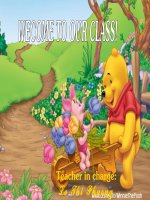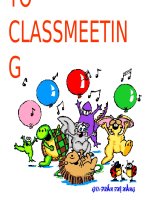UNIT 4 – language
Bạn đang xem bản rút gọn của tài liệu. Xem và tải ngay bản đầy đủ của tài liệu tại đây (715.03 KB, 15 trang )
UNIT 4 – LESSON 2: LANGUAGE
Matching suitable pictures with activities:
2
1
4
a.
Helping the old
b. Green summer campaign
c. Teaching children
d. Blood donation
e. Exam season Supporting program
3
5
Teacher: Bui Thu Hien - LTK High School
Teacher: Bui Thu Hien - LTK High School
Read the conversation in GETTING STARTED again. Find the adjectives ending with the following suffixes:
-ed
disadvantaged
interested
excited
-ing
-ful
-less
interesting
useful
hopeless
helpful
meaningful
I. Vocabulary:
Task 1. Read the conversation in GETTING STARTED again. Find the adjectives ending with the following suffixes:
-ed
disadvantaged
interested
excited
-ing
-ful
-less
interesting
useful
hopeless
helpful
meaningful
I. Vocabulary:
What is the meaning of these adjective endings? Match and find out:
A
1. Adjectives ending with -ed
2. Adjectives ending with -ing
3. Adjectives ending with -ful
4. Adjectives ending with -less
B
a. have positive meaning
b. Have negative meaning
c. are used to describe how people feel
d. are used to describe things and situations
I. Vocabulary:
Task 2. Use the words in the brackets with appropriate endings from task 1 to complete the following sentences:
1. If people spend most of their time doing nothing, they will find their lives_______________ . (mean)
2. I am ______________ in doing charity work. (interest)
3. Last year, she was really _______________ at English. She couldn’t even say a word in English. Now her English is much better.
meaningless
(hope)
4. The new teacher’s
advice was very____________ . His students could learn English vocabulary faster. (use)
interested
5. They were ___________ to know that their contributions were ____________ to the poor people in that area. (excite, mean)
hopeless
6. Our school volunteer activities are very_________________ . (excite)
useful
excited
meaningful
exciting
II. Pronunciation:
1. Listen and repeat:
/nd/
/ŋ/
/nt/
Second
Interesting
Announcement
Friend
Teaching
Student
Understand
Exciting
Advertisement
Planned
Helping
Spent
Grand
Training
Environment
II. Pronunciation:
2. Practise saying the following sentences. Pay attention to the pronunciation of the ending
sounds /nd/, / ŋ/, /nt/.
1. I don’t understand what the second friend says.
2. It is interesting and exciting to teach English to children in disadvantaged areas.
3. That student didn’t listen to the announcement for the job advertisement.
III. Grammar:
Task 1: Rewrite the sentences in the past tense, using the time expression in brackets
1.
I hardly ever wear jeans to school. (yesterday)
I wore jeans to school yesterday.
2. My sister and I buy a lot of clothes in the summer. (last summer)
My sister and I bought a lot of clothes last summer.
3. My father sometimes reads newspapers in bed. (last night)
4. My mother makes
my bed
onnewspapers
weekends. (last
Sunday)
My father
read
in bed
last night.
5. I write letters
my grandparents
at last
the Sunday.
weekend. (yesterday afternoon)
My to
mother
made my bed
I wrote letters to my grandparents yesterday afternoon.
III. Grammar:
III. Grammar:
Task 2: Match 1-5 with a-e and complete the sentences in the past simple or the past continuous.
1.We were walking in the park .
2.While I was talking to a friend, .
3.We lost the keys .
4.We were sitting on a bench in the park .
5.When the phone rang, .
a. I (have)was having
a bath.
b. when someone (take)
ourtook
school bags.
asked
c. the teacher (ask) me a
question.
d. when it (start) started
to rain.
e. while we (play)
were
playing
in the
garden.
1. Exercises in workbook: A1, A2, B1, B2, B3
2. Prepare the next lesson carefully: UNIT 4 – LESSON 3 – READING









